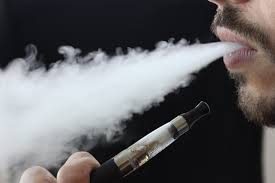The US saw its sixth vaping-related death when a 50-year-old woman passed away in Kansas this past Wednesday, according to an article from CNN. While the woman had other pre-existing health conditions, the incident is one of 450 possible cases of lung illness associated with the use of e-cigarette products reported to the CDC from 33 states and one US territory. The increase in these incidents across the US is raising concerns nationwide about the immediate and long-term effects of e-cigarettes, especially for young adults.
According to the National Institute of Health (NIH), THC and e-cigarette vaping has become increasingly popular among teenagers and young adults in recent years, with 37.3 percent of 12th graders reporting the use of vapes in some capacity. Across high school and college campuses, vaping is heavily prevalent and has become a part of social culture.
29 percent of college students reported e-cigarette usage in a study done by the NIH, which would suggest that around 765 students on campus utilize e-cigarettes.
The Wawa on High Street, often frequented by Lafayette students, is a certified vendor of E-Cigarette Juul Pods, and sells out “frequently” according to one employee. One of the most popular vaping products, Juul pods each contain around 20 cigarettes worth of nicotine.
The rise in popularity of vaping and purchase of devices is becoming a cause for serious concern among parents and medical professionals, especially as more information about the short and long term health implications of the practice becomes known.
Director of Health Services Dr. Jeffrey Goldstein said that, at this point, the effects of vaping are still not known enough to fully understand the long term health impacts on the human body.
“We are just starting to learn about what the long term consequences are,” he said. “There is just not research that has been done in a reliable way that points to the risk and long term health consequences associated with vaping.”
While these consequences remain speculative, Goldstein added, that does not mean they are not severe.
Goldstein also noted that vaping is particularly attractive to college students for a variety of reasons, one of which being how they have been marketed in recent years.
“Vaping has been marketed nicely, as a less toxic way of smoking nicotine and other products with health consequences that are not as serious,” he said.
According to an article in the New York Times, vaping was first marketed to help smokers wean off of cigarette usage, but has instead exploded in popularity among teens who were not previously smokers. As vaping has become more widespread, more cases of lung illness are being seen among young users with otherwise healthy bodies.
Following multiple cases of vaping-related pulmonary illness, the state of New Jersey issued an official health alert warning citizens against vaping and e-cigarette usage, as described in an article in the Philly Voice.




















































































































